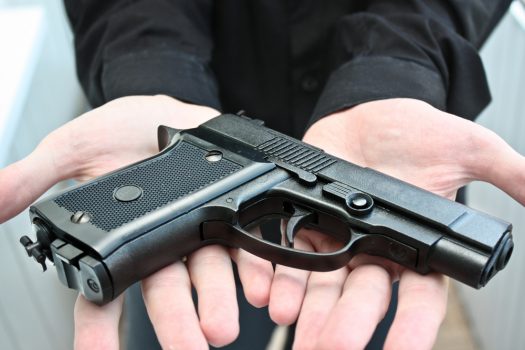In State v. Chisum (decided February 5, 2019) the Supreme Court of New Jersey held that police officers lacked a reasonable suspicion to justify detaining 10 party guests in a motel room after concluding their investigation of a noise complaint. Accordingly, the weapons they discovered during the investigatory detention were illegally seized and must be suppressed.
Facts of State v. Chisum
Shortly before midnight on February 7, 2014, two Neptune police officers, Officer Harris and Officer Sibole, responded to a noise complaint at a motel room at the Crystal Inn Motel. The officers decided not to issue a summons when the renter of the room immediately complied with their request to turn down the music. The police nevertheless conducted an investigatory detention on a group of ten people and ran warrant checks on them. More than twenty minutes into the detention, police arrested defendant Deyvon Chisum for an outstanding warrant and discovered a concealed firearm on him. They then conducted pat-down searches on the remaining occupants and found a firearm on defendant Keshown Woodard. The handgun was seized, and Woodard was placed under arrest. Chisum and Woodard were indicted for weapons offenses.
The trial court denied defendants’ motions to suppress the evidence. It determined that the police entered the motel room lawfully, Chisum was properly arrested because he had an outstanding warrant, and the seizure of the firearm he possessed was obtained through a lawful search incident to arrest. The trial court also found that the police were justified in conducting pat-down searches of the remaining occupants in the room for the officers’ safety. Chisum pled guilty to one weapons charge; Woodard pled guilty to one weapons offense and to a drug possession offense arising from an unrelated indictment. The Appellate Division panel affirmed.
Court’s Decision in State v. Chisum
The Supreme Court of New Jersey reversed. “Once the renter of the motel room lowered the volume of the music and the police declined to issue summonses, the police no longer had any reasonable suspicion that would justify the continued detention of the room’s occupants. Once the noise was abated, the police no longer had an independent basis to detain the occupants, or a basis to run warrant checks on them,” Justice Faustino Fernandez-Vina wrote. “Such action was unlawful. And because the detention and warrant checks were unlawful, the subsequent pat-down of Woodard was also improper.”
In reaching its decision, the court explained that an investigative detention (also known as a Terry stop) that is premised on less than reasonable and articulable suspicion is an unlawful seizure. In addition, evidence discovered during the course of an unconstitutional detention is subject to the exclusionary rule.
“[P]olice officers are required to use the least intrusive means necessary in effectuating the purpose of an investigative detention, and such a detention cannot last any longer than necessary to effectuate the purpose of the stop,” Fernandez-Vina explained. “The police officers in this instance clearly did not use the least intrusive means necessary to carry out their investigative detention.”
The court emphasized in State v. Chisum that just because a location to which police officers are dispatched is a high-crime area does not mean that the residents in that area have lesser constitutional protection from random stops. It further highlighted that Crystal Inn’s reputation as a place where previous criminal activity transpired was unconnected to the circumstances surrounding the specific noise complaint on the night in question.
While New Jersey Supreme Court acknowledged that the importance of police officer safety, it found that it is “insufficient justification for police officers to detain ten occupants of a motel room and run warrant checks on each of them simply because citizens violated a noise ordinance and then promptly abated the noise upon police arrival.” Because the investigative detention was based on less than reasonable suspicion, the seizure of the weapon on Chisum was unlawful and subject to the exclusionary rule. The court further held that the subsequent need to pat-down Woodard was also unnecessary, and the firearm found on him was also subject to the exclusionary rule. The court remanded the cases back the trial court for the withdrawal of defendants’ guilty pleas and further proceedings.

